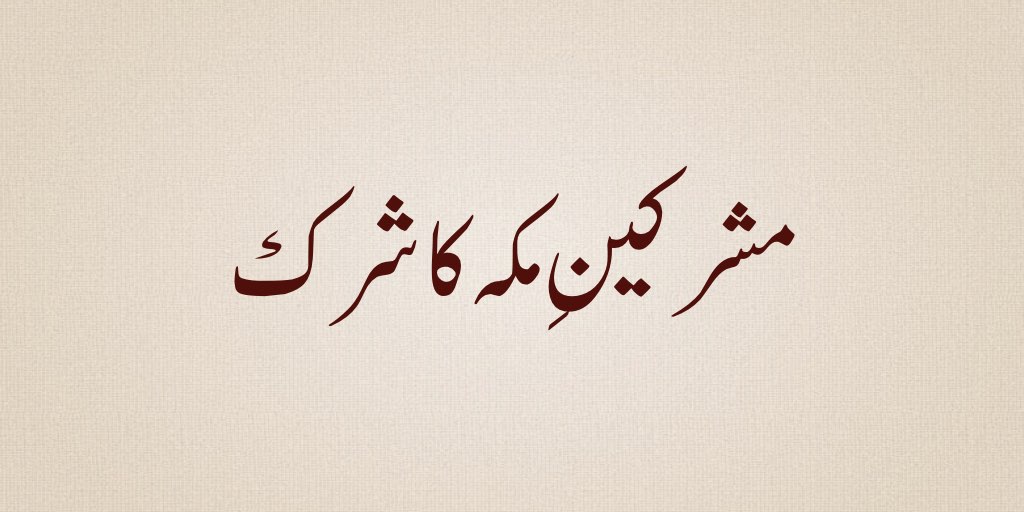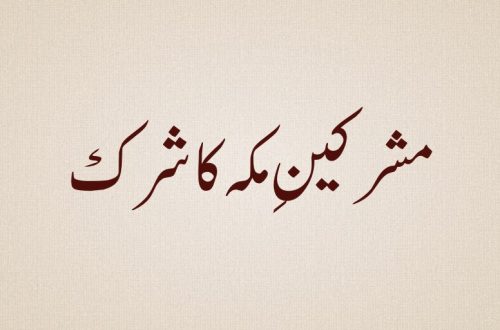By Jon MC
Preface:
That Islamic belief and attitudes are grounded by the Islamic canon is a given, but neither does the canon dictate belief itself, the individual may always believe or not believe (at least in private), in part or total, as they choose – which is a point made in the Koran itself.Further even the Koran is subject to interpretation, hence the Islamic ‘science’ of Tafseer which ranges from the literalistic to the (frankly) fanciful in some Sufi traditions.
So let me make it clear what this article is not about.
It is not about the beliefs of any individual Muslim, most of whom are as good, kind and decent as any other group; ethnic, religious or otherwise, of people.
Mushrik
According to the Quranic Arabic Corpus, the word “mushrikoon” is derived from the triliteral root shin-ra-kaf which occurs 168 times in the Koran in eight different forms.
An important form of “shin-ra-kaf” is the noun-form “shirk”. This occurs five times in the Koran, 31:13, 34:22, 35:14, 35:40 and 46:4, the latter two in the root meaning of having a “share” in an attribute of Allah.
Shirk is the unforgivable sin in Islam.
In its verb-form “ashraka”, “to associate (partners)” – usually either explicitly or more often implicitly with Allah, occurs 71 times in the Koran. See for example 2:96, 3:64, 4:36, 6:19, 7:33, 9:31, 10:18.
“Mushrik”, from which is derived both “Mushrikoon” (“associators”) and “Mushrikat” (the latter meaning a female “associator”) occurs 49 times. See for example 2:105, 2:135, 2:221, 3:67, 3:95, 6:14, 6:79.
As ever, its translation is variable depending on both translator and verse.
The word is variously translated as ‘idolator’ (A, E, P, SD), ‘polytheist’, (S, SI) ‘associator’ (I, Q, MA[he makes a phrase of it: “ascribe divinity to other beings”]), the term “associator” is a little opaque, but is a ‘shorthand’ for “one who associates others with Allah” – more on this later) and ‘pagan’ (M, Y).
The Oxford English Dictionary defines a “pagan” as someone who “does not believe in Jehovah, Christ or Allah” and as a second meaning “a non-Christian”. If we assume the Islamic parallel in pagan, then for a Muslim ‘pagan’ means “non-Muslim”. If we take the wider definition then “pagan” would exclude Christians and Jews – but see below.
HK define Mushrikoon thus in 2:105: “Al-Mushrikoon (the disbelievers in the Oneness of Allah, idolaters, polytheists, pagans, etc.)” which is a “catch-all” definition in that no non-Muslim believes “in the Oneness of Allah”, or more accurately no non-Muslim believes this doctrinal position (which is central to Islamic Theological thinking) and this alone makes a person a non-Muslim, or pagan.
As previously described, one “class” of Mushrikoon was clearly the Meccan Polytheists who believed in other gods as well as Allah. Given that they were the original “associators” this lends further circumstantial weight to “Allah” being a pre-Islamic “supreme deity”.
A second potential class, though one which the Koran implicitly denies, is derived from Mohammed’s highly deficient and defective understanding of the Doctrine of the Trinity. (Perhaps I should not criticise him too much here, since this Doctrine is notoriously hard to grasp, never mind cogently explain, even for Christians). In the Christian ‘Trinity’ as misunderstood by Mohammed, the Christians worshipped “two other gods” Christ and Mary (see 5:116) besides Allah in a single “godhead” and thus they associated others with Allah and were Mushrikoon.
However, K2:105 specifically separates “people of the book” (Jews and Christians) from the “Mushrikoon”: “Neither those who disbelieve[Arabic: “kafaroo” – kaffir] among the people of the Scripture (Jews and Christians) nor Al-Mushrikoon (the disbelievers in the Oneness of Allah, idolaters, polytheists, pagans, etc.)…” (Hilali-Khan).
Note: the “kaffirs amongst the peoples of the scripture” were those Jews and Christians who did not convert to Islam rather than “bad” Jews or Christians and that those who are “believers amongst …”, therefore, are converts to Islam.
Then again there is also this verse: K.9:30 (Arberry): “The Jews say, ‘Ezra is the Son of God’; the Christians say, ‘The Messiah is the Son of God.’ That is the utterance of their mouths, conforming with the unbelievers before them…”
This verse’s pertinence here is the claim that “The Jews say ‘Ezra is the Son of God.’…” Setting aside the fact that this is a blatant lie, it also means that the definition of “Mushrikoon” extends to Christians (with some justification) and the Jews (with no justification at all).
(It thus follows that the Koran is having it both ways! The “people of the book” are and are not “mushrikoon”. This is logically impossible.)
Implicit within the meaning of the word “Mushrikoon” is the implication of sin. Shirk is the association of anything with (or instead of) Allah in any way and (as said) it is Islam’s unforgivable sin. Mushrikoon are those who so associate. Therefore Mushrikoon have committed shirk by their association.
9:113 tells us that Mushrikoon are, indeed, “unforgivable”.
6:121 warns that for a Muslim to follow anything – even advice – that is not in accordance with the precepts of Islam makes you a “Mushrikoon”. This is an important verse in that it implies that any action that falls outside the bounds of Sharia – i.e. is illegal within Sharia – is “shirk” (technically “lesser shirk”) and you run the risk (at least) of making yourself a Mushrikoon. A further point here is that this must, logically, apply to all people. The fact that you are a “kaffir” means that you don’t follow Islam, but the fact that you don’t follow Islam means you have set “something” up as a “partner” with, or worse, in opposition to, Allah. Hence almost inevitably, any non-Muslim is an associator – a “Mushrikoon”, whether or not they have any belief. (I’ll let the reader ponder the Theology in this.)
Note: On this point it is important to remind the reader of the doctrines of “Tayseer” (“ease”) which allows any given prescription of Sharia/Islam to be set aside if it’s implementation is impossible or would cause trouble for the Muslims and that of “Darura (“necessity”) by which a Muslim, if s/he has no other recourse may use un-Islamic means to obtain a beneficial outcome. Implicit is the proviso that once conditions permit, those requirements that have been set aside will be reinstated.
I think this is why a number of Koran translators use the term ‘pagan’ and mean it in its narrow definition (“non-Muslims”) to translate Mushrikoon.
More generally then (following on from the above), “al-Mushrikoon” are considered to be sinful.
6:106 warns Muslims to “turn aside from the Mushrikoon” as does 15:94.
The start of Sura 9 declares that Muslims are free from all treaty obligations to Mushrikoon, except for those who have abided completely scrupulously by every “jot and tittle” of their treaty. Those must be fulfilled until their end, but then the Mushrikoon should be killed (9:5 “verse of the sword”), unless they are Jews or Christians and willing to accept dhimmitude, 9:29. Muslims are also told to be aware that Mushrikoon do not honour treaties and that in any breach of treaty it is a priori their fault. Thus Muslims are taught that Mushrikoon are untrustworthy and unreliable folk who deserve to be killed, unless they accept dhimmitude. The command to fight Mushrikoon is repeated in 9:36.
Note: Dhimmitude is the result of a non-Muslim accepting a Dhimmah (or “treaty of protection”) imposed by the Islamic authorities. As token of this the Dhimmi must pay the Jizya (a head tax) and abide by strict conditions to ensure his/her safety. It should be pointed out that what the Dhimmi was primarily protected from was the surrounding Muslim population.
9:28 tells us that Mushrikoon are “najjis”, ritually unclean.
Several times Ibrahim (Abraham) is held up as an example of a “Hanif”, that is a monotheist who worshipped Allah. This meant that he was not a Mushrikoon. (See for example 2:135, 3:67, 3:95, 6:161, 16:120). Thus again we have the implication that anyone who does not worship Allah and follow Islam (now that it has been revealed) is a “Mushrikoon”. A similar implication is found with reference to Mohammed in 28:87, 30:31.
98:6 tells us that Mushrikoon “are the worst of creatures”.
Summary
- Strictly a “Mushrik” is “one who associates others with Allah”.
- Many translators extend this definition to cover all those who do not believe in Islam. The grounds for this are found in:
- extensions of the definition explicitly given in the Koran (Jews and Christians are made to be “associators” in 9:30).
- Extensions made implicitly by the comparison of Abraham and Mohammed to “others”. This is essentially a negative definition in that it defines what a Mushrik is not and so, by implication, what one is: i.e. any non-Muslim. By this sort of definition even atheists and agnostics would fall into the category.
- Thus, although the “Mushrikoon” were originally (mostly) the Meccan polytheists, the term was extended to cover almost all non-Muslims and thus it becomes an effective synonym for “kaffir”, who then take on the characteristics ascribed to “Mushrikoon” in the Koran.
- The meaning of Mushrikoon implies within it a sinful, untrustworthy, unreliable nature and indeed Mushrikoon are declared “the worst of creatures” (98:6) and they are dirty, polluting, unclean people (9:28).
- Muslims are told to “turn away” from Mushrikoon, (probably) both physically in the sense of keeping Mushriks “at arm’s length” societally and spiritually in the sense of not adopting any of their ways and/or beliefs.
- Note that in this “turning away” from Mushrikoon we see the birth of the separatist nature of many Muslim communities in the West.
- Mushrikoon are to be killed – unless they accept dhimmitude (9:5 and 9:36).
To put it in a sentence (but take a deep breath before trying to say it!): “the Mushrikoon” (or Kaffir) are unclean, dirty persons who are untrustworthy and deceitful sinners who dare to make something equally important (or more so) for themselves than Allah and for this unforgivable sin they justly deserve death (unless they accept dhimmitude) but if you can’t kill them, at least keep them at arm’s length and do not, under any circumstances, become like them in any way.”






One Comment
maillog
I thought you did a great job here. The language is excellent and the picture is tasteful, but you come across as nervous about what you might say next. If you preserve this walk, I have no doubt that I will return more often.